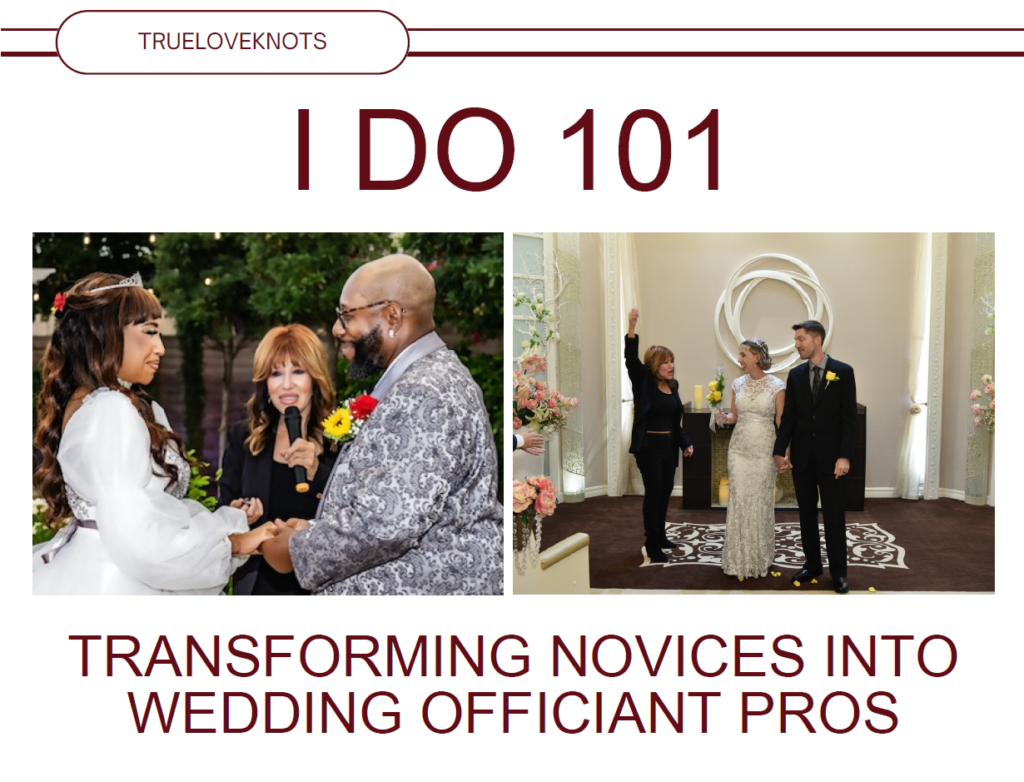I do 101 Transforming Novices into Wedding Officiant PROs

I do 101 Transforming Novices into Wedding Officiant PROs From Novice to Pro: Unlocking Success with a Wedding Officiant Certification Course Introduction to Wedding Officiation Roles and Duties of a Wedding Officiant Benefits of Wedding Officiant Certification Collaboration Between Wedding Officiants and Wedding Planners Building a Successful Wedding Officiant Career Conclusion The Role of a Wedding Officiant in Creating a Memorable Celebration of Love A wedding day is a magical celebration of love and affection. The wedding officiant, who conducts the ceremony, plays a crucial role in making the day unforgettable for many couples. Being a wedding officiant is more than just reciting words; it’s about crafting a meaningful, personalized service that reflects the couple’s love story. If you’re considering a career as a wedding officiant, completing a wedding officiant certification course can be a game-changer. This article explores the journey from beginner to professional and the many advantages of becoming a certified wedding officiant. Additionally, we’ll discuss the partnership between wedding officiants and wedding planners as they often collaborate to create unforgettable weddings. Unveiling the Essence: Discovering the Role and Duties of a Wedding Officiant A wedding officiant is responsible for conducting wedding ceremonies, legally binding couples in marriage. They play a crucial role in setting the tone for the entire event and their words can leave a lasting impression. A skilled wedding officiant not only carries out the legal aspects of the service but also creates a unique and heartfelt experience for the couple and their guests. A wedding officiant holds a pivotal role in crafting and orchestrating a couple’s special day. Some of the primary obligations of a wedding officiant include: 1. Meeting with the Couple: Wedding officiants meet with the couple to get to know them, understand their romantic tale, and talk about their vision for the function. 2. Creating the Ceremony: They work with the couple to craft a remarkable and meaningful service script, including promises, readings, and any special rituals or traditions. 3. Performing the Ceremony: On the wedding day, the officiant directs the service, directing the couple through their promises, and it is met to guarantee the legal necessities. 4. Filing Legal Documents: Wedding officiants are liable for completing and recording the necessary legal paperwork to make the marriage official. Why Pick Wedding Officiant Certification? Turning into a confirmed wedding officiant is a significant stage for anyone aspiring to succeed in this job. Here are a portion of the vital benefits of completing a wedding officiant certification course: 1. Professionalism: Certification demonstrates your obligation to professionalism and ability in your field. It gives couples certainty that a qualified and experienced officiant will direct their function. 2. Legal Knowledge: A certification course provides you with a profound understanding of the legal prerequisites for officiating weddings. This information is crucial to guarantee that marriages are legally restricted and perceived. 3. Ceremony Planning: Certification courses often remember training for how to create personalized and memorable functions. You’ll learn how to craft one-of-a-kind content, incorporate meaningful components, and adapt to various cultural and strict traditions. 4. Networking Opportunities: Certification programs often provide potential chances to associate with other professionals in the wedding business, like wedding planners, photographers, and settings. 5. Marketability: Ensured wedding officiants have an edge in the cutthroat industry. Couples are bound to pick an officiant with perceived credentials. 6. Confidence: Completing a certification course supports your certainty and furnishes you with the abilities and information to handle various wedding scenarios. THE RELATIONSHIP BETWEEN WEDDING OFFICIANTS AND WEDDING PLANNERS Wedding officiants often work intimately with wedding planners to create seamless and unforgettable weddings. This is the way they collaborate: 1. Initial Meetings: Wedding planners acquaint couples with potential officiants and facilitate gatherings to discuss service ideas and inclinations. 2. Ceremony Design: Wedding officiants and planners cooperate in planning the function, incorporating the couple’s vision, traditions, and rituals. 3. Timelines and Logistics: Wedding planners guarantee that the service chugs along as expected, coordinating the planning of the processional, music signs, and any particular components in the function. 4. Rehearsals: At times, wedding officiants and planners may lead a service rehearsal to guarantee that everybody knows their jobs and obligations. 5. Legal Aspects: Wedding planners assist in guaranteeing that all legal documentation, for example, marriage licenses, is for the officiant to sign. 6. Day-Of Coordination: On the wedding day, wedding planners guarantee that all that runs according to plan, while the officiant centers around managing the service. Building Your Wedding Officiant Career Completing a wedding officiant certification course is only the start of your excursion from novice to pro. Here are some additional moves toward fabricating an influential wedding officiant career: 1. Gain Experience: Offer to officiate functions for loved ones or elect to be an assistant officiant at weddings to gain hands-on experience. 2. Develop Your Style: Find your extraordinary officiating style and approach. This could include storytelling, humor, or incorporating cultural traditions. 3. Market Yourself: Create a professional site, establish a presence on social media, and organization with other wedding professionals to attract clients. 4. Price Your Services: Decide your estimating structure based on your experience, market demand, and the intricacy of the functions you offer. 5. Continuing Education: Stay updated on wedding patterns and attend studios and seminars to enhance your abilities. 6. Client Communication: Maintain open and compelling communication with couples all through the planning process to guarantee their vision is realized. 7. Create a Portfolio: Report your functions and create a portfolio to showcase your work to potential clients. 8. Client Reviews: Encourage satisfied couples to leave positive audits and testimonials to construct your reputation. Remember, that each couple is unique, and each wedding you officiate presents another chance to create a beautiful and meaningful service. As a confirmed wedding officiant, you have the information and abilities to make these minutes memorable. CONCLUSION: TYING THE LAST KNOT Wrapping Up the Guide to Excellence in Wedding Officiation The Value of Completing a Wedding Officiant Certification Course If you’re interested in a career
